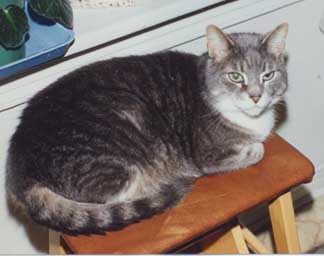|
A Cat Called Mouse
September 1, 2006
By Karen L. Rempel Arthur
One early spring day he materialized on my verandah, announced his arrival and claimed
that he was going to stay. I looked into those wistful mint green eyes and said, "Whoa,
not so fast! You must be someone’s cat." It took him several days of hanging around to
convince me that he really was homeless.
He was grey in color with four white feet, something like a deer mouse greatly enlarged,
so I gave him the silly name of "Mouse."

Mouse
Friendly right from the beginning, Mouse quickly made the acquaintance of my cockatiel.
Kelly, and I never had to worry about him having that particular bird for lunch, though
he was a dedicated, efficient hunter outside.
Some months later, my neighbor’s daughter, Kathleen, surprised me by asking, "Did you
know that every afternoon Mouse comes to our front door for a half hour visit with my
mother?"
"He does?" I asked.
This was news, but then cats are quite secretive about certain matters.
Now Betty, Kathleen’s mother, aged 60 something, had a myriad of serious things wrong
with her and she was housebound most of the time. Summers were too hot for her and
winters were too cold. Betty watched the world from her livingroom window or through
the eyes of her family and visitors.
Apparently Mouse’s visits were a daily delight. He’d come in the front door, she’d give
him a saucer of milk, pet him, talk to him and he would sit there quietly purring and
looking at her with those unusual eyes. Then he’d go to the back door, be let out, and
head home.
This went on for months and months. Winter blew in and one cold, dark night just after
Christmas, Betty passed away quite suddenly, though not unexpectedly. That day Mouse
walked around my house listlessly. He didn’t want to go out, didn’t want to eat, didn’t
want to do anything.
"What’s wrong Mousie?" I asked him, but of course he couldn’t explain. Something was
certainly wrong though I could scarcely attribute this to Betty’s passing. He was a cat.
Scottish relatives flew in for the funeral, and it wasn’t long before several of them
knocked on my door and asked, "Could we see the cat that always visited Betty?"
Of course they could, and it was then that it dawned on me how significant these brief
daily visits were to the ailing woman. Betty, who spent the daylight hours alone, until
her husband came from work, relished my little cat coming to her house. He brought with
him a piece of the outside world, even if it was just from his own feline perspective.
To my neighbor, he was someone to pet and pamper.
So Betty’s relatives visited Mouse, petted him and said with teary eyes, "We’re so
happy that Betty had this little visitor every day. She looked forward to him coming
ever so much. She wrote about him in her letters."
I was so pleased that I could share this little cat and that he had made such an
impression on my neighbor, but thought that was the end of it.
A few weeks after the funeral, however, I met Betty’s daughter when we were shoveling
snow from our sidewalks.
"You know Mousie came over a couple days after the funeral," she informed me.
"He did?" I said.
"Uh huh, he came to the front door like he always did. I let him in and he went
halfway upstairs, which he’s never done before. He sat down, looked up the steps,
came back down and headed for the back door. He wanted out, so I let him. He didn’t
even want a saucer of milk. "
We stood leaning on our shovels thinking about this.
"You know," Kathleen continued, "He’s never been back."
I stared in silence, my thoughts swirling around in my head, astonished at the
intuitiveness of that little animal, how he understood that Betty was gone and was not
coming back. He had just come back one more time to check this out and make sure of it
for himself. His work there was done, and Mouse never went back.
|



